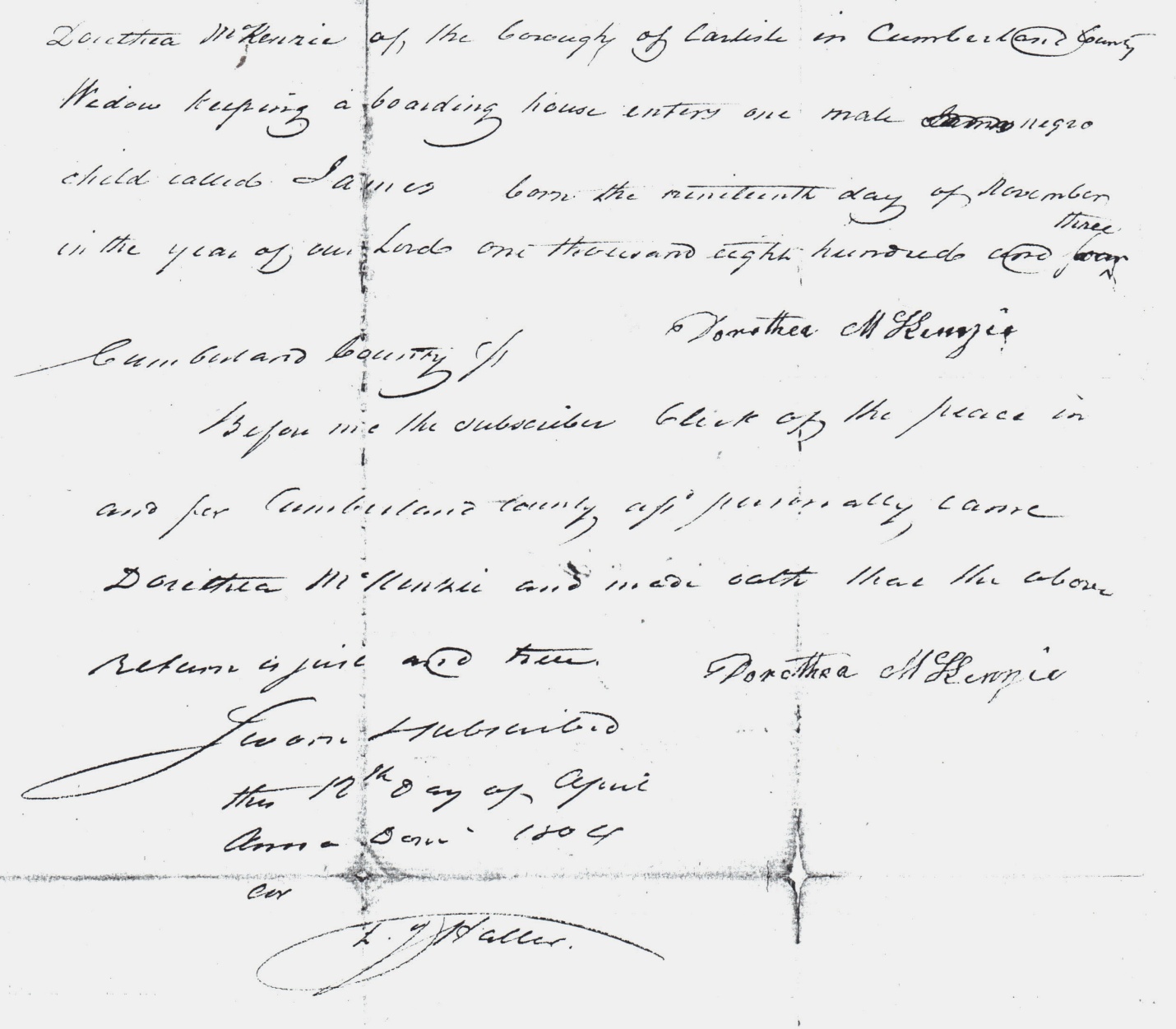Dorothea McKenzie, the daughter of a Quaker ironmaster, became a widow at the age of 38, never remarried, and, until her death, ran a genteel boarding house in Carlisle with the help of her slaves.
Dorothea’s father, Thomas Maybury, established the Green Lane Forge in the Perkiomen Valley in what is now Montgomery County, Pennsylvania as well as the Hereford Furnace. Her mother, Sophia Rutter, was a descendant of Pennsylvania ironmaster, Thomas Rutter.[1]
Dorothy was ten years old when her father died. Through the marriages of her brothers and sister, she was related to several wealthy families including the Warders of Philadelphia. It was likely through these connections that she met her future husband, merchant Robert McKenzie.
Nothing is known about the lives of Dorothea and Robert before they settled in Carlisle in 1771. They purchased Lot #277 on East High Street, but sold it a year later and moved to West Pennsborough Township.[2] With the intention of joining Thompson’s Battalion and “going on Expedition to Boston,” McKenzie made his will on July 14, 1775.[3] He bequeathed all of his “estate in America” to his wife Dolly. He left his brother Samuel the gun which he said he left at home. At the time of his death, on March 12, 1776, McKenzie was a Lieutenant in the 1st Pennsylvania Regiment.
Several years after her husband’s death, Dorothea moved back to Carlisle with her slave.[4] In accordance with the newly established Pennsylvania Act of 1780, on October 23, 1780 she registered her three female slaves; Dina aged 35, Silvey aged 12 and Nancy aged 2.[5]
Dorothea lived a comfortable life in Carlisle. Tax assessments for the 1780s and 1790s record that she was taxed for slaves as well as owning silver plate. She was a member of St. John’s Episcopal Church and likely socialized with members of Carlisle’s gentry. Occasionally, she received legacies from her relatives such as the £100 she received in 1787 from her nephew Charles Maybury of Montgomery County, Pennsylvania.[6]
To supplement her income, Dorothea kept a “genteel” boarding house in a two-story stone house on East High street that she rented from the heirs of John Duncan. In 1802, John Brown’s nephew, John Brown Parker, was about to attend Dickinson College, and Brown asked James Hamilton to find a good place for his nephew to stay in Carlisle. In a letter to Brown, dated December 24, 1802, Judge Hamilton informed him “I have engaged boarding for your nephew at the house of Mrs. McKenzie, a genteel place, where he will have a room to himself at 40 pounds per year. He finds his own wood & candles & washing. This I think is low.”[7] Parker was still boarding with her in 1804 when Hamilton wrote to John Brown, telling him that Mrs. McKinzie requested Parker’s money in advance.[8]
In 1801, Dorothea, as required by law, recorded the birth of a female Negro child called Dinah, and in 1804 she recorded the birth on November 19, 1803, of a Negro male called James.
Dorothea wrote her will in May, 1805, a month before her death. She directed that her slave Sill was to be given her freedom for her long service. She also willed her bed and bedding and part of her kitchen furniture to Sill. She directed that her executors, Dr. Samuel McCoskry and James Duncan, hold the rest of her estate, including the service of her Negroes Charlotte, Dinah and Jim, in trust for her niece Rachel Jago and mentioned Rachels’s son George Washington Jones.[9]
Dorothea died on June 16, 1805. Her obituary, printed in the June 21, 1805 edition of Kline’s Carlisle Gazette, stated “Died--On Sunday evening last, in her 68th year, MRS. DOROTHY MCKINZIE, widow and relict of Robert McKinzie, Esq., deceased, formerly of this county, and daughter of Thomas Maybury, Esq., deceased, of Greenlane Forge, near Pottsgrove.”
A public vendue was held at 10:00 on Saturday, June 29, 1805 at the house she had occupied in Carlisle. Her executors advertised that a “number of good feather beds, and bedding, and a variety of household and kitchen furniture would be sold as well as a milch cow.” They also noted that her house would be let from the time of the sale until April next.[10]

